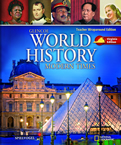Glencoe World History: Modern Times © 2011 Virginia EditionChapter 25:
Changing Global PatternsChapter OverviewsStunning developments in science, technology, industry, and agriculture have brought political, economic, and environmental benefits and costs. New types of organizations have given governments and people new ways to respond to the world's challenges. Section 1 Challenges of a New Century
The world has seen great developments in science, technology, industry, and agriculture. Space travel and high-speed communications have opened up new frontiers. Weapons of mass destruction threaten the international community. Health care has allowed people to live longer, but challenges such as HIV/AIDS remain. Both GE foods and organic farming have increased. Globalization has broken down many barriers between nations, and interest in democracy has revived. Yet populations have exploded, environmental risk has grown, the gap between rich and poor has increased, and hunger and disease remain widespread. Regional, ethnic, and religious conflicts often spread across borders. Many people are still not afforded basic human rights. Acts of terrorism, a part of modern society, have worldwide effects. The gender gap has narrowed, but less so in developing countries. Section 2 New Global Communities
The global nature of many problems in the twentieth century has led to the development of global organizations. The United Nations, formed at the end of World War II, has been an important body in which nations can voice concerns and address problems. The world population is growing and aging. Global migration patterns are affecting how people live. Since World War II, the economy has become global and international trade has increased. Citizen groups have responded to a host of challenges—from the dangers of nuclear power to nonviolence. Nongovernmental organizations have allowed citizens to expand their influence on issues such as disarmament, the environment, and human rights. One lesson of history is that being involved in the affairs of society may create opportunities to make wise choices, even in an age that is often crisis-laden and chaotic.  | 

















